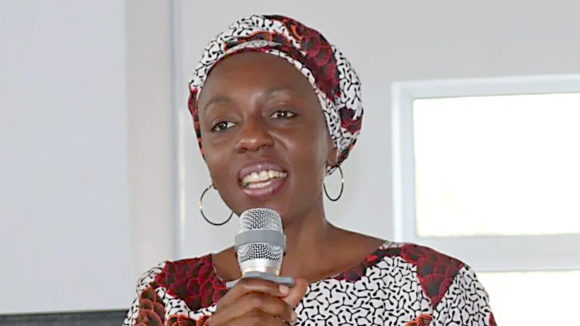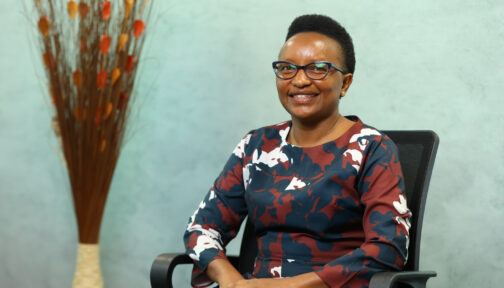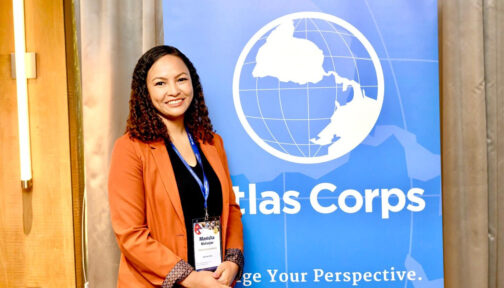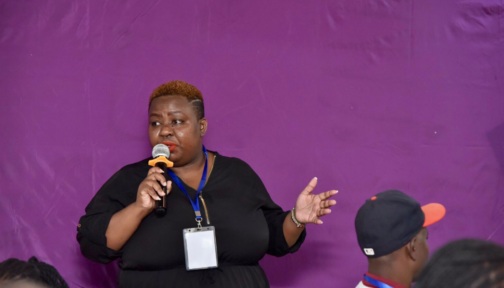Joy Shu’aibu is country director for Sightsavers in Nigeria.
Here she explains more about Inclusive Futures’ work on sexual and reproductive health and rights in Nigeria and her motivations for working in inclusion.
Joy’s story
“Supporting people with disabilities to use their voices so that they can unleash their potential has been the high point of my career.
“By training, I am a doctor. I have a fellowship in family medicine and a Master’s in public health. I joined Sightsavers about seven years ago. As country director for Sightsavers in Nigeria, I oversee a variety of different programmes in inclusive education, inclusive employment as well as inclusive health.
“With our partners, we are working to understand the barriers that persons with disabilities face in accessing family planning services and come up with strategies to address some of these barriers. We are also looking at the health system itself and engaging with service providers to understand what their perceptions of disability are and what is preventing them from providing family planning services to people with disabilities.
“Our ultimate goal is for persons with disabilities to be able to advocate for their own decision-making on health issues. We are supporting organisations of persons with disabilities (OPDs) so that they can advocate for their rights and the rights of the people they represent.”
Barriers to inclusive health care
“The barriers that exist in the health system can be broadly classified into structural, attitudinal and policy barriers.
“To begin with, health facilities that provide family planning services may not be accessible for people with disabilities. You go to a health facility, they do not have any plans to accommodate people with visual, physical or hearing impairments – there are no ramps, no assigned sign language interpreters. People with disabilities don’t feel welcome because even physically accessing those buildings in those health facilities is a huge challenge.
“The attitude of health workers is also a barrier. They aren’t given any training. There’s no particular attention given to helping them learn how to interact or relate to people with disabilities.
“In terms of policy, people with disabilities are usually some of the most financially vulnerable in society. Despite this, they are expected to pay the same amount as other people to access family planning information and services.”
Barriers based on gender and disability
“Then there are cultural issues. Because of religious and cultural views, it is perceived that men should make decisions on behalf of women in terms of reproductive healthcare. Women rely financially on their husbands which limits their access to family planning or reproductive health services in general.
“In northern Nigeria, you also find that education for girls is deprioritised. So women may lack the education to speak up for themselves or feel that they don’t have any right to reproductive healthcare.
“We know that whatever barriers women face, in general women with disabilities face even more. And we have seen several situations where women with disabilities are being taken advantage of. Women with intellectual or even physical disabilities can face sexual abuse because of the stigma that some cultures associate with disability.”
Working in partnership
“When we talk about issues of inclusion, we don’t want to talk about it with sentiments but with evidence, which is why we are working with partners like BBC Media Action and PENDA (Programme for Evidence to Inform Disability Action).
“At the very beginning of our family planning project, BBC Media Action carried out research, which involved going to the communities and holding discussion groups with people with disabilities. They spoke to men and women of different age groups and looked at how people’s experiences of family planning services differed depending on gender, age and disability to help us understand more about the barriers to family planning and what they mean to the people that face them.
“The insights we have gained from our initial research have helped us to decide on the themes and messages we will use in our social behaviour change communications.
“We want to see how messaging around inclusive family planning can help increase awareness of family planning services, as well as access and uptake of these services.”
Driving systems change
“The Sustainable Development Goals (SDGs) have clearly outlined the need to make sure that no one is left behind.
“That’s why when we look at systems, whether they’re related to health, or education, we identify those who are likely to be left behind – including people with disabilities. The danger is that if we neglect this group of people then achieving the SDGs will almost be impossible.
“Health systems are not sensitive and responsive to inclusive health programs. It isn’t that they don’t want to be inclusive, but they don’t know how to.
“Through our work, we have realised that if we are talking about inclusive health and inclusive family planning, there are lots of stakeholders that need to come into play. They need to be speaking to each other and agree on how to take things forward.
“For example, we try to get government representatives, policymakers and healthcare providers in the same room as people with disabilities so that they hear from them directly. This helps to improve their awareness and understanding of the issues and understand how they can help to address these problems.”



